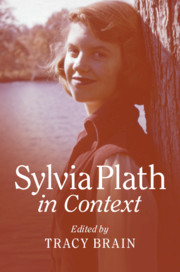37 results
Index
-
- Book:
- Sylvia Plath in Context
- Published online:
- 03 August 2019
- Print publication:
- 22 August 2019, pp 397-420
-
- Chapter
- Export citation
Copyright page
-
- Book:
- Sylvia Plath in Context
- Published online:
- 03 August 2019
- Print publication:
- 22 August 2019, pp iv-iv
-
- Chapter
- Export citation
Key Archives
-
- Book:
- Sylvia Plath in Context
- Published online:
- 03 August 2019
- Print publication:
- 22 August 2019, pp xxvii-xxvii
-
- Chapter
- Export citation
Chronology
-
- Book:
- Sylvia Plath in Context
- Published online:
- 03 August 2019
- Print publication:
- 22 August 2019, pp xix-xxiv
-
- Chapter
- Export citation
Notes on Contributors
-
- Book:
- Sylvia Plath in Context
- Published online:
- 03 August 2019
- Print publication:
- 22 August 2019, pp ix-xvii
-
- Chapter
- Export citation
Part IV - Sexual and Gender Contexts
-
- Book:
- Sylvia Plath in Context
- Published online:
- 03 August 2019
- Print publication:
- 22 August 2019, pp 167-200
-
- Chapter
- Export citation
Part V - Political and Religious Contexts
-
- Book:
- Sylvia Plath in Context
- Published online:
- 03 August 2019
- Print publication:
- 22 August 2019, pp 201-242
-
- Chapter
- Export citation
Part VIII - The Creative Afterlife
-
- Book:
- Sylvia Plath in Context
- Published online:
- 03 August 2019
- Print publication:
- 22 August 2019, pp 327-370
-
- Chapter
- Export citation
Part VII - Plath and Place
-
- Book:
- Sylvia Plath in Context
- Published online:
- 03 August 2019
- Print publication:
- 22 August 2019, pp 295-326
-
- Chapter
- Export citation
Abbreviations and Textual Note
-
- Book:
- Sylvia Plath in Context
- Published online:
- 03 August 2019
- Print publication:
- 22 August 2019, pp xxv-xxvi
-
- Chapter
- Export citation
Introduction
-
-
- Book:
- Sylvia Plath in Context
- Published online:
- 03 August 2019
- Print publication:
- 22 August 2019, pp xxviii-10
-
- Chapter
- Export citation
Part I - Literary Contexts
-
- Book:
- Sylvia Plath in Context
- Published online:
- 03 August 2019
- Print publication:
- 22 August 2019, pp 11-62
-
- Chapter
- Export citation
Contents
-
- Book:
- Sylvia Plath in Context
- Published online:
- 03 August 2019
- Print publication:
- 22 August 2019, pp v-viii
-
- Chapter
- Export citation
Chapter 8 - Sylvia Plath and You
- from Part II - Literary Technique and Influence
-
-
- Book:
- Sylvia Plath in Context
- Published online:
- 03 August 2019
- Print publication:
- 22 August 2019, pp 83-92
-
- Chapter
- Export citation
Bibliography
-
- Book:
- Sylvia Plath in Context
- Published online:
- 03 August 2019
- Print publication:
- 22 August 2019, pp 371-396
-
- Chapter
- Export citation
Acknowledgements
-
- Book:
- Sylvia Plath in Context
- Published online:
- 03 August 2019
- Print publication:
- 22 August 2019, pp xviii-xviii
-
- Chapter
- Export citation
Part III - Cultural Contexts
-
- Book:
- Sylvia Plath in Context
- Published online:
- 03 August 2019
- Print publication:
- 22 August 2019, pp 115-166
-
- Chapter
- Export citation
Part II - Literary Technique and Influence
-
- Book:
- Sylvia Plath in Context
- Published online:
- 03 August 2019
- Print publication:
- 22 August 2019, pp 63-114
-
- Chapter
- Export citation
Part VI - Biographical Contexts
-
- Book:
- Sylvia Plath in Context
- Published online:
- 03 August 2019
- Print publication:
- 22 August 2019, pp 243-294
-
- Chapter
- Export citation

Sylvia Plath in Context
-
- Published online:
- 03 August 2019
- Print publication:
- 22 August 2019



